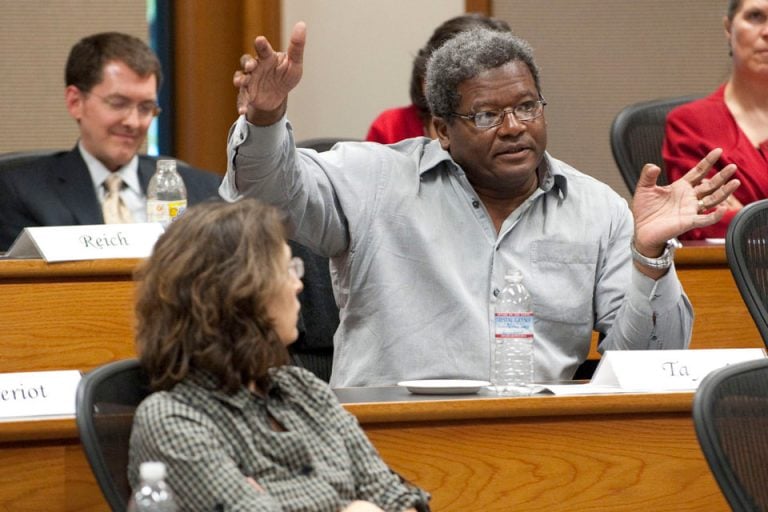Kenneth Taylor, the Henry Waldgrave Stuart Professor of Philosophy, died unexpectedly in his home on Monday night. The SF Chronicle reported the cause of death as a probable heart attack. Taylor was a champion of humanistic knowledge and an extraordinarily prolific scholar of the philosophy of meaning, communication and the mind. He was also a heavily involved faculty member at Stanford, having chaired the philosophy department from 2001-09 and then directed the symbolic systems program from 2009 until September of this year.
Taylor co-founded the long-running, nationally syndicated public radio show Philosophy Talk in 2005, a program he co-hosted until his death.
The show is aimed at questioning “everything but your intelligence.” It explores a wide variety of topics, including AI and free will. Shows are often taped in front of a live audience at CEMEX Auditorium. On Tuesday afternoon, the show’s official Twitter account acknowledged Taylor’s passing and linked to a video made by Ken Taylor in June titled, “To Live a Life Well.”
“As many of you know, @ktphilosopher was the show’s co-founder, longtime co-host, chief cheerleader, and guiding light,” the tweet reads.
At Stanford, Taylor has served multiple terms on the Faculty Senate, first from 2009-11, second in 2015 and third from 2017 to as recent as June of this Year. Starting in 2018, he was a member of the Faculty Senate’s Steering Committee and the Thinking Matters Governance Board. He also co-directed the Public Humanities Program.
Taylor grew up in Sandusky, Ohio. He was the first in his family to attend college, wrestling for Notre Dame and graduating from the Program in Liberal Studies in 1977. He earned his Ph.D. in philosophy from the University of Chicago in 1984. Before arriving at Stanford, Taylor was an assistant professor at Wesleyan University and the University of Maryland, and an associate professor at Rutgers University.
He became an associate professor at Stanford in 1995. Taylor is most known for teaching PHIL 80: “Mind, Matter, and Meaning,” a class that studies, “central topics in metaphysics, epistemology, philosophy of language and mind.”
Thomas Wasow, the Clarence Irving Lewis Professor in Philosophy, emeritus, and professor emeritus of linguistics, told Stanford News that Taylor massively expanded symbolic systems enrollment and scholarly effort during his tenure.
“While Ken was a philosopher to his core, his interests were broadly interdisciplinary, reaching into psychology, linguistics, artificial intelligence and politics,” he said. “He saw connections among his diverse interests, and the Symbolic Systems Program was a perfect fit for him.”
Sunwoo Lee ’20, one of Taylor’s students and a student researcher at Philosophy Talk, told The Daily that his Education as Self-Fashioning (ESF) seminar deeply impacted her life and she was very grateful to him.
“Ken Taylor deeply cared about not only what we were taught but also how we were taught,” Lee wrote. “He was a true believer in ‘philosophizing’ (a favorite word of his) through contrarian dialogues delivered in the form of theatrical performance.”
Grace Paterson Ph.D. ’18, a postdoctoral scholar at the University of Vienna who had Taylor as her advisor in college, told Stanford News, “He shaped how I think and who I am intellectually.”
Lee told The Daily that Taylor’s many friends and collaborators are stepping in to finish Taylor’s classes for the quarter. Ruth Starkman, the instructor who co-led Taylor’s ESF class, will replace the class final with an open mic in memory of Taylor. Starkman and Taylor had been longtime friends, and one of Taylor’s last photographs was of himself and Starkman dressed respectively as Epictetus and the sheep described in one of the Greek thinker’s discourses.
The show Philosophy Talk is produced by San Francisco public station KALW and broadcast on more than 100 stations across the world. Taylor co-hosted the show with Joshua Landy; John Perry and Debra Satz also previously hosted show. Perry described Taylor’s death as a loss not only to Stanford but to all those who were inspired by his teaching and thinking.
“It’s a loss to those who were intrigued by his opinions — readily available in radio and print — which were always presented with reason, often anticipating issues, problems and positions not yet conceptualized by others, and always presented forcefully and confidently,” Perry told Stanford News.
Outside of radio and his work with students, Taylor wrote prolifically. He authored more than 30 scholarly articles and three books: “Meaning and Truth: An Introduction to the Philosophy of Language,” “Reference and the Rational Mind” and “Meaning Diminished: Toward Metaphysically Modest Semantics.”
At the time of his death, Taylor was putting the finishing touches on his fourth book, “Referring to the World: An Opinionated Introduction to Reference.” The manuscript, commissioned by Oxford, was not his only book in the works. He had two other books in progress: “Toward a Natural History of Normativity” and “Pragmatics Everywhere.” On his Stanford philosophy faculty page he described the former as “a naturalization of many things normative — including ethical norms, linguistic norms, epistemic norms and logical norms.” The latter project, barely begun, was a collection of Taylor’s thoughts on the pragmatics of communication that he described as “still a bit of a gleam in my eyes.”
Philosophy Talk is working on producing a special tribute episode to Taylor, featuring colleagues, old students and former guests from the program. The special episode is expected to air on Sunday Dec. 29th.
This article has been corrected to remove a statement that Philosophy Talk would continue; it is unclear whether the program will continue. This article has also been corrected to reflect that Taylor did not manage student researchers at the show; another individual did. This article has also been corrected to reflect that John Perry and Debra Satz are former hosts of the show. Lastly the date of death has been changed to Monday from Tuesday. The Daily regrets these errors.
Contact Cooper Veit at cveit ‘at’ stanford.edu and Michael Espinosa at mesp2021 ‘at’ stanford.edu.
